What is a Systematic Review?
- Details
- Parent Category: Calder Communications Blog
- Category: Tips for Researchers
- Hits: 38569
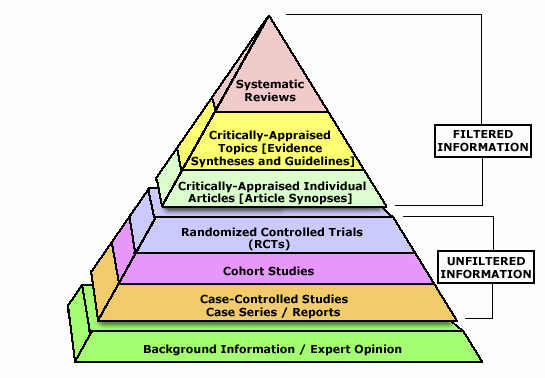
“A systematic review attempts to collate all empirical evidence that fits pre-specified eligibility criteria in order to answer a specific research question [1].”
Research questions that are broader or do not have much empirical evidence on the topic might be better suited for other types of reviews.
The key characteristics of a systematic review are:
• a clearly defined set of objectives with inclusion and exclusion criteria for studies;
• an explicit and reproducible methodology;
• a rigorous and systematic search of the literature;
• an assessment of the validity of the findings of the included studies;
• data extraction and management;
• an analysis and interpretation of results (possible meta-analysis);
• a report for publication.
Prior to undertaking a systematic review, state your aims and study design in your protocol to reduce the risk of bias that may arise if you were to formulate the inclusion criteria for studies after seeing the results of your literature search. You should also search for existing systematic reviews in the Cochrane Library, as well as for newly registered protocols in PROSPERO to ascertain that a new review is required and that no one is currently doing the research you wish to do.
Please be aware that a systematic review can't be done alone! You need to have at least one co-author to reduce potential author bias in the selection of studies and data extraction, and to help detect any errors. In addition, subject experts can help you to clarify issues related to your research question, librarians can develop comprehensive search strategies and identify appropriate databases, and statisticians can assist with data analysis.
How can Calder Library help?
Librarians can partner with you on systematic reviews and other types of review articles. If the systematic review road is right for your question, add us to your author team. We can design and manage complex, thorough searches in multiple databases for you. We can also provide you with:
• EndNote, RefWorks or Mendeley libraries of de-duplicated results;
• Detailed search strategies for each database;
• A written narrative of the search methodology for your publication.
References
1. Higgins JPT, Green S (editors). Cochrane Handbook for Systematic Reviews of Interventions Version 5.1.0 [updated March 2011]. The Cochrane Collaboration, 2011. Available from www.handbook.cochrane.org.
2. Petticrew M. Systematic reviews from astronomy to zoology: myths and misconceptions. BMJ : British Medical Journal. 2001;322(7278):98-101. (http://www.bmj.com/content/322/7278/98.1)
Subject Resource Guides @ Calder Library
- Details
- Category: Calder Communications Blog
- Hits: 21812
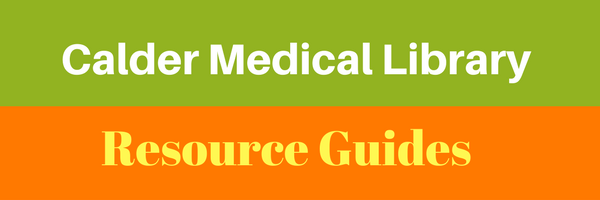
Resource Guides developed by Calder Medical Librarians provide links to relevant resources on different subjects and lists librarian subject experts with their contact information.
- Clinicians will find the guides for Clinicians, Drug Information, and Medical Mobile Apps useful.
- Researchers will be interested in the resource guides for Researchers, Collaboration and Mentoring, Grants, Scholarly Communication, Genomics, and Public Health.
- Medical students will save time by finding useful links on the guides for Medical Students, Evidence-Based Medicine, Online Tutorials, and Personal Librarian Program.
- For Residents, the most relevant guides are Residents, Clinicians, Drug Information, and Medical Mobile Apps.
- Psychiatrists and Psychologists will find important links in the guides that cover Clinical Psychiatry and Psychology, as well as the Clinicians, Drug Information, and Medical Mobile Apps guides.
- Useful links for Nurses appear in the resource guides for Nursing, Drug Information, Researchers, Consumer Health, and Free Authoritative Websites.
Additional information about specific Resource Guides will appear in forthcoming blogs and the Librarians welcome recommendations for other Guide topics.
Links to all of Calder’s Resource Guides can be found on the Library’s Website.
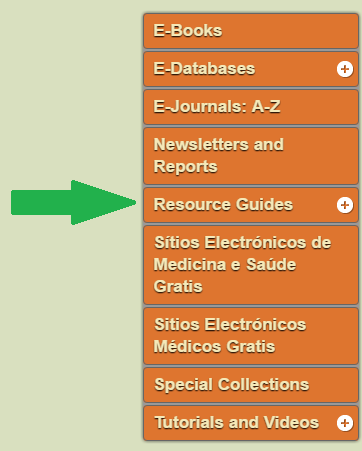
BMJ Case Reports Available Now at Calder
- Details
- Parent Category: Calder Communications Blog
- Category: New Resources Announcements
- Hits: 52728

THINKING OF PUBLISHING A MEDICAL CASE REPORT?
Calder Library now subscribes to BMJ Case Reports, a reputable, peer-reviewed journal dedicated to publishing case reports. University of Miami faculty, students, staff, and UM/JMH residents can submit cases to BMJ Case Reports free of charge.
Advantages of publishing in BMJ Case Reports include:
- no publication fees
- journal indexed in PubMed
- templates provided for easy formatting
- videos and images can be submitted
- online submission
Types of cases commonly published in BJM Case Reports include those that present a diagnostic, ethical, or management challenge; cases that highlight mechanisms of injury, pharmacology, or histopathology; global health cases; and cases covering differential diagnosis, decision making, management, clinical guidelines, and pathology. Guidelines have been developed for writing case reports. The CARE Guidelines, aim to “satisfy the need for precision, completeness, and transparency… to better inform clinical study design, provide early signals of effectiveness and harms, and improve healthcare delivery.” (Gagnier JJ, et al., BMJ Case Rep 2013 doi:10.1136/bcr-2013-201554).
To obtain the BMJ Case Reports Institutional Fellowship Code for free publication, please contact a Reference Librarian at Calder at 305-243-6648 or send an email request to .
Other recommended journals* for students and residents submitting case reports:
- Journal of Medical Case Reports
- Medicine (Baltimore)
- American Journal of Case Reports
- Journal of General Internal Medicine
- American Journal of Medicine
*Publication fees may be charged.
For a list of new journals that publish medical case reports, see Akers, KG, JMLA 2016 doi http://dx.doi.org/10.3163/1536-5050.104.2.010
uSearch
- Details
- Parent Category: Calder Communications Blog
- Category: Come to the Library!
- Hits: 79220

Now is the time to Explore uSearch! If you have not done so yet, we invite you to give uSearch a try!
uSearch is a one-stop search engine for finding physical and digital resources available in all University of Miami libraries. With a single search, resources from across seven UM Libraries can be displayed. uSearch enables the University of Miami Libraries, the Law Library, and Calder Medical Library to move forward with a unified platform that benefits both Library users and Library personnel. This is especially beneficial for interdisciplinary research and education across all UM campuses.
Sign-In to uSearch to:
• access full-text e-resources
• locate print or other physical Library resources
• request items available locally or through interlibrary loan
• save items to your e-shelf lists and export citations
Contact a Calder Reference Librarian for assistance with uSearch by calling 305-243-6648, emailing , or by visiting the Library.
HS Talks
- Details
- Parent Category: Calder Communications Blog
- Category: New Resources Announcements
- Hits: 79937
The Calder Library now provides access to the HSTalks Biomedical and Life Sciences Collection of audio-visual lectures. Each lecture is specially commissioned from a leading world expert, including Nobel Laureates and Lasker prize winners.
The Collection contains over 2,000 lectures, which are divided into more than 100 comprehensive series. All the talks have been indexed by 'Subject Area' into both 'Categories' and 'Therapeutic Areas'. Clicking on any of these subject areas will show a list of available lectures for each area of interest.
The search function identifies talks within the specific 'Category' or 'Therapeutic Area.’ Below each Category or Area appears a list of individual talks, the number of 'Series', as well as a list of all the 'Experts' who have presented talks in this field.
Categories
- Agriculture and Environmental Science
- Biochemistry
- Cancer
- Cell Biology
- Clinical Medicine
- Diseases, Disorders, & Treatments
- Genetics & Epigenetics
- Immunology
- Metabolism & Nutrition
- Methods
- Microbiology
- Neurology
- Omics & Systems Biology
- Pharmaceutical Sciences
- Reproduction & Development
Therapeutic Areas
- Cardiovascular & Metabolic
- Dermatology
- Gynecology & Obstetrics
- Hematology
- Immunology & Inflammation
- Infectious Disease
- Neuroscience
- Oncology
- Ophthalmology
- Oral Health
- Respiratory Diseases
- Vaccines
HSTalks is accessible from the Library homepage Database drop-down, the Blackboard portal, and the UM Libraries’ new catalog search engine—uSearch.
For a quick video tutorial for using HSTalks, please visit the HSTalks website.
For print instructions, see below:
• The 'View All Talks' in the Lecture section has the option to filter the results by category and date released.
• The HSTalks logo at the top of the page will bring users back to the home page.
• Entering a search term in the search bar at the center of the homepage searches the entire collection of talks.
• Results can be narrowed down to suit specific needs by using filter options.
• Features include a “Navigable Slide Index” to navigate to different parts of the talk, a list of the 'Topics Covered', as well as the talk control panel that can be used to pause, change the volume level, and change to full screen if desired.
• Below the talk is an option to share the talk with a colleague.
• An option to open printable slide handouts is available.
• An online form can be used to request updates and new lecture releases.
• Registration is required to access HS Talks remotely via mobile devices--just click on the “padlock” on the top right of the screen.
GIS: Geographic Information Systems at Calder Library
- Details
- Parent Category: Calder Communications Blog
- Category: Come to the Library!
- Hits: 132257
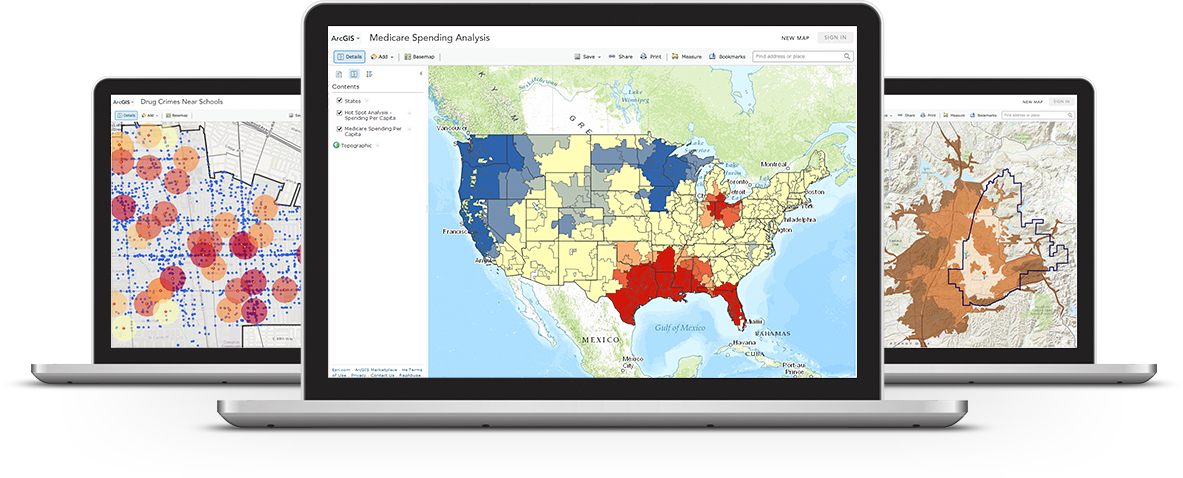
What is GIS?
GIS, or geographic information systems, are computer-based tools used to collect, create, store, visualize, analyze, and interpret geographic data.
Geographers recognized the importance and unique features of space two thousand years ago. Topography and natural resources are location-specific attributes that influence the incidence of diseases as well as opportunities for prevention and intervention.
GIS Data Types
Geographic data (also called spatial, or geospatial data) identifies the geographic location of features. These data include anything on the globe that can be associated with a location. Roads, country boundaries, and address are all types of spatial data.
Geographically-referenced attribute data describes features of the population such as death certificates, trauma registries, census data, land and property data, and EMS provider data. Attribute data is "geo-referenced" to a location-specific value.
The combination of multiple geo-referenced data sets allows GIS to create powerful spatial analyses.
Uses of GIS
The most common ways in which GIS technology may be used are:
• Management of resources.
• Environmental impact assessment.
• Infrastructure development.
• Choosing strategic market locations by companies.
• Demographics and population studies.
• Increasing accessibility of health care services.
• Finding more cost-effective health care delivery modes.
• Analyzing patients’ present and future health care needs.
• Identifying a hospital's most profitable services.
• Logistics in times of natural disasters for emergency response teams.
• Planning for environmental protection efforts by governmental authorities.
• Monitoring diseases and pandemics by agencies to identify patterns of occurrence.
Training and Support
Calder Library will offer a Geographic Information Systems Workshop focusing on Public Health Applications of GIS that introduces attendees to the ArcGIS Desktop software, ArcGIS Online, and Community Analyst. The ArcGIS software is licensed by UM for non-commercial research and education.
The workshop will be on November 7, 2016, from 10 am -12 pm, in the Library's 3rd Floor Classroom. Seats are limited.
RSVP at to reserve your seat.
GIS Librarian, Abraham Parrish, is also available for one-on-one consultation on Tuesdays from 3-7 pm on the first floor of Calder Library. Walk-ins are welcome.
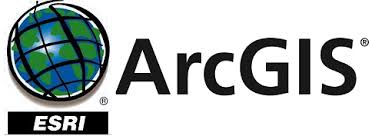
Now Available: uSearch
- Details
- Parent Category: Calder Communications Blog
- Category: New Resources Announcements
- Hits: 62721
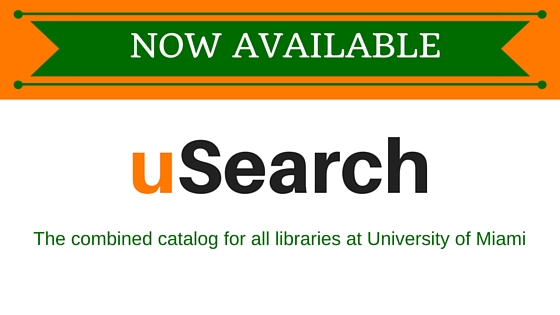
uSearch is here! uSearch is a one-stop search engine for finding physical and digital resources available in all University of Miami libraries.
Sign in to:
- find articles, books, audio and video, e-resources, and all types of materials
- request items available locally or through interlibrary loan
- save items to your e-shelf lists and export citations
- select Advanced Search to look for a specific item or to apply specific search criteria.
Medical Campus users will have automatic access to resources and remote access will continue to be provided with Single Sign-On Authentication for UM students and employees.
Remote access for JMH residents and staff and other approved visiting library users will require registering for a restricted-use CaneID/C-Number.
Follow these steps:
(1) Register for a CaneID/ C-Number
(2) Register at Calder Library with photo ID
You can register in person or online.
For additional information about uSearch, please read this article in the e-Veritas.
Contact a Reference Librarian for assistance with using uSearch by calling 305-243-6648, emailing , or by visiting the Library.
BoardVitals—a powerful tool to help prepare for the Boards!
- Details
- Parent Category: Calder Communications Blog
- Category: New Resources Announcements
- Hits: 95195

The University of Miami now has access to BoardVitals, a high-quality, effective, and powerful exam review tool that can be used anytime and anywhere via phone, tablet, or computer. BoardVitals provides access to test banks to help prepare for board exams for over 30 medical specialties and the USMLE Step 3.
This BoardVitals tool offers:
• Highest quality board review questions from leading medical publishers, research institutions, and practicing clinicians.
• High-yield, vetted questions listed up front to maximize study time.
• Constantly evolving cloud-based system that updates every 24 to 48 hours.
• Allows users to create customized practice tests.
• Advanced statistics so users can see strengths and weaknesses.
• Detailed, current explanations with each answer, with references and links to sources.
• Allows administrators to monitor user’s usage and performance.
• Allows Faculty to send customized exams to students.
Onsite Registration Instruction
If onsite for your first login, click the BoardVitals Register button and use your institutional email address to sign up.
Remote Registration Instructions
If you are accessing BoardVitals for the first time remotely, you must use your @med.miami.edu, @jhsmiami.org or @miami.edu email address for registration and you will receive an email with a validation link.
After initial registration, you can access BoardVitals from the Database dropdown on the Calder Library Website, or sign in from the Board Vitals Website.
Click here to learn more and register today: http://marketing.statref.com/boardvitals_university_of_miami.html
Get books, book chapters and journal articles for FREE!
- Details
- Category: Calder Communications Blog
- Hits: 70032

Calder Library personnel will locate books, book chapters and journal articles for you for FREE!
• Ever hit a paywall when trying to download an article?
• Ever arrive at a dead-end when searching for a book in the library?
Visit the library homepage and submit a completed Inter-library Loan / Journal Photocopy Request Form for library materials not held by the University of Miami:
https://www.library.miami.edu/calder/index.html
Although the average delivery time is 1-3 days for articles/book chapters and 1-2 weeks for books, articles and chapters are often received much sooner.
For further assistance, please contact the Inter-library Loan (ILL) department at (305)243-6749 to request books, book chapters and articles from a non-UM library FREE-of-charge for all UM students, faculty, and staff and Jackson employees!
Calder Library is on Facebook
- Details
- Written by: Kelsa Bartley
- Parent Category: Calder Communications Blog
- Category: Come to the Library!
- Hits: 61210
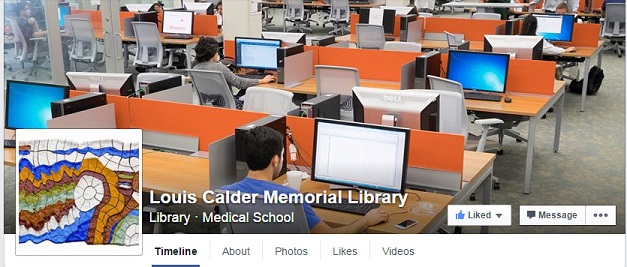
Calder Library began its first Social Media initiative by launching its Facebook page. It will be used to promote the Library’s resources and services, and to post announcements and links to useful websites. Patrons can access the Library’s Facebook page from Calder’s website, or by searching for Louis Calder Memorial Library on Facebook.
We encourage patrons to visit Calder Library’s Facebook page, “Like” the page, and “Share” any of the postings!
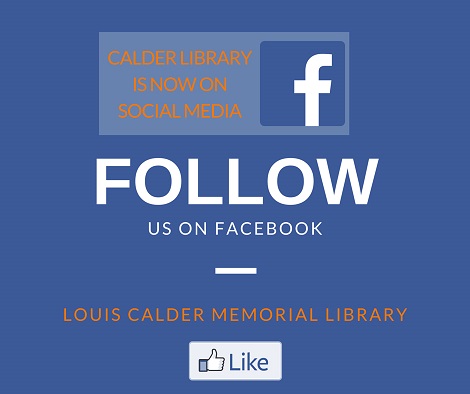
3D Printing now available at Calder Library
- Details
- Written by: Kelsa Bartley
- Parent Category: Calder Communications Blog
- Category: New Resources Announcements
- Hits: 102668
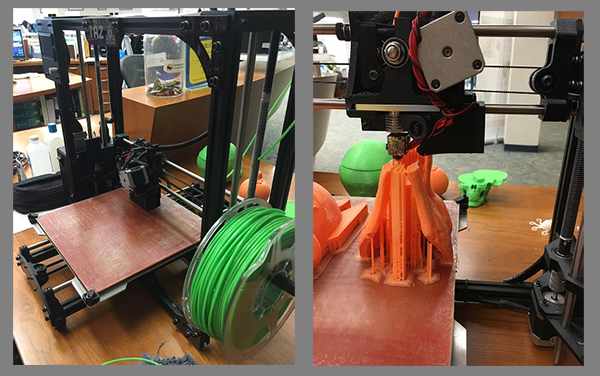
The Calder Library now offers 3D printing for all students, faculty, staff and other affiliated patrons.
Users can submit a job request at the Circulation desk or by contacting Library staff via email with ‘3D Printing’ in the subject line. Requestors are welcome to view the printer in action—although this 3D printing is a slow process that can take hours!
Click here to view the Library’s 3D Printing Policy.
3D printer users are encouraged to take advantage of shared files located on the NIH 3D Print Exchange. The NIH 3D Print Exchange provides models in formats that are readily compatible with 3D printers, and offers a unique set of tools to create and share 3D-printable models related to biomedical science. Find designs by clicking the Discover button. You can also share original print files on the Exchange by clicking the Share button.
- Mango Languages
- Personal Librarians for Medical Students
- Upgrade Individual Mendeley Accounts to Mendeley Institution Edition--New at UM!
- Scopus Research Database -- Update and Training
- BATES VISUAL GUIDE TO PHYSICAL EXAMINATION
- Welcome to Calder Library: A Changing Environment
- Joanna Briggs Institute EBP Database
- Welcome, New Residents!
- More Embase Resources
- EMBASE is Back!
Page 2 of 17
